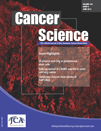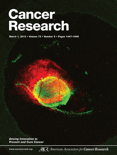
JCO Precision Oncology
Scope & Guideline
Connecting Researchers and Clinicians in Precision Oncology
Introduction
Aims and Scopes
- Molecular Profiling and Genetic Testing:
The journal emphasizes the importance of molecular profiling and genetic testing in identifying actionable mutations and guiding therapeutic decisions in cancer care. - Precision Medicine Approaches:
It explores innovative precision medicine strategies that tailor treatment to individual patient characteristics, including genetic, epigenetic, and tumor microenvironment factors. - Emerging Biomarkers and Therapeutics:
The journal highlights research on novel biomarkers and therapeutic agents, including targeted therapies and immunotherapies, that show promise in improving treatment efficacy. - Clinical Trial Innovations:
A focus on the design and implementation of clinical trials that leverage genomic data to optimize patient selection and treatment regimens. - Patient-Centric Research:
It includes studies that assess patient experiences and preferences regarding genetic testing and precision oncology, ensuring that patient perspectives are integrated into clinical practice.
Trending and Emerging
- Liquid Biopsy Technologies:
There is a growing trend towards the use of liquid biopsies for non-invasive cancer diagnosis and monitoring, providing real-time insights into tumor dynamics and treatment response. - Integration of Artificial Intelligence in Genomics:
Research is increasingly focused on utilizing machine learning and AI technologies to analyze complex genomic data, enhancing predictive models and treatment strategies. - Focus on Rare Tumors and Novel Alterations:
Emerging studies are exploring rare tumors and unique genetic alterations, broadening the scope of precision oncology to include less common malignancies. - Health Disparities and Equity in Cancer Care:
There is an increasing emphasis on understanding and addressing health disparities in cancer treatment, with research aimed at ensuring equitable access to precision oncology. - Combination Therapies Targeting Multiple Pathways:
An upward trend is observed in studies investigating combination therapies that target multiple oncogenic pathways, aiming to overcome resistance and improve efficacy.
Declining or Waning
- Traditional Chemotherapy Approaches:
Research focusing on standard chemotherapy regimens without molecular targeting is becoming less prominent, as the field shifts towards personalized medicine and targeted therapies. - General Cancer Screening Methods:
There is a noticeable decline in publications centered on broad cancer screening methods, as more specific and targeted approaches based on genetic predispositions gain traction. - Non-Genomic Biomarkers:
The interest in non-genomic biomarkers is waning, with a stronger emphasis now on genetic and molecular markers that provide actionable insights into treatment.
Similar Journals

Cancer Research Communications
Connecting researchers for a cancer-free future.Cancer Research Communications is an esteemed journal published by the American Association for Cancer Research, a leading organization in the field of oncology. This journal aims to advance knowledge in cancer research through the dissemination of high-quality, peer-reviewed articles that cover a wide range of topics related to cancer biology, treatment modalities, and prevention strategies. As an open-access journal, Cancer Research Communications ensures that vital research findings are accessible to a global audience, promoting collaboration and innovation within the scientific community. The journal serves as a crucial platform for researchers, professionals, and students to share their insights and foster the exchange of effective cancer therapies and methodologies. With a commitment to excellence, it plays a significant role in shaping the future of cancer research and therapeutic development.

CANCER SCIENCE
Exploring the forefront of cancer science and medicine.Cancer Science, an esteemed journal published by Wiley, stands at the forefront of oncology research, boasting an impressive impact factor and a classification in the Q1 category for its contributions in Cancer Research, Medicine, and Oncology as of 2023. Since its inception in 2003 and transitioning to an Open Access model in 2014, the journal has facilitated global dissemination of critical research findings, ensuring that vital information remains accessible to researchers, clinicians, and students alike. With its comprehensive scope covering cutting-edge discoveries in cancer biochemistry, genetics, and molecular biology, Cancer Science is recognized for its rigorous peer-review process and significant contributions to advancing our understanding of cancer. The journal, located at 111 River St, Hoboken, NJ, is an essential resource for anyone dedicated to improving treatment outcomes and pushing the boundaries of cancer research.

CANCER RESEARCH
Elevating the standards of cancer research and innovation.Cancer Research, published by the American Association for Cancer Research, is a premier journal in the field of oncology, renowned for its commitment to advancing cancer research since its inception in 1941. With an impressive impact factor reflecting its vital role in the field, this journal consistently ranks in the Q1 quartile for both Cancer Research and Oncology, positioning it among the top 7.5% of journals in these categories. The journal serves as a crucial platform for researchers, professionals, and students to disseminate and gain insights into groundbreaking studies that shape our understanding of cancer biology, prevention, diagnosis, and treatment. While it is not an open-access publication, its rigorous peer-review process ensures that only high-quality research is published, thus maintaining a standard of excellence in the scientific community. With a strong legacy and an ever-expanding influence, Cancer Research continues to be essential for anyone dedicated to the fight against cancer, showcasing cutting-edge research that drives scientific discovery and innovation.

CURRENT TREATMENT OPTIONS IN ONCOLOGY
Advancing the Frontiers of Cancer TreatmentCURRENT TREATMENT OPTIONS IN ONCOLOGY, published by Springer, is a premier academic journal dedicated to disseminating cutting-edge research and advancements in the field of oncology and pharmacology. With a commendable impact factor and ranked in the Q1 category in both oncology and pharmacology for 2023, this journal positions itself as a leading resource for researchers, healthcare professionals, and students alike, offering insightful reviews and original articles that critically evaluate treatment methodologies and clinical practices. Covering a wide scope of topics from early detection to innovative therapies, it fosters the translation of research findings into clinical applications. With its convergence years spanning from 2000 to 2024, CURRENT TREATMENT OPTIONS IN ONCOLOGY continues to be at the forefront of oncological research, providing a platform for scholars to explore the latest therapeutic options and improve patient outcomes. Highly regarded in the academic community, this journal is essential for anyone looking to stay informed about the dynamic landscape of cancer treatment.

NEOPLASIA
Transforming cancer research for a healthier tomorrow.NEOPLASIA is an esteemed open-access journal dedicated to advancing the field of oncology, published by Elsevier Science Inc. since 1999. With an impressive impact factor and recognition as a Q1 journal in Cancer Research for 2023, it holds a significant position within the scientific community, specifically ranking in the 74th percentile globally in the categories of Biochemistry, Genetics, and Molecular Biology. NEOPLASIA seeks to provide a comprehensive platform for innovative research, covering a wide array of topics in cancer biology, treatment methodologies, and therapeutic advancements. Researchers, professionals, and students are encouraged to utilize this resource, which is easily accessible to foster collaboration and stimulate progress in cancer research. As it converges its efforts towards the future of oncology, this journal is poised to remain at the forefront of transformative discoveries that shape our understanding and treatment of cancer.

NATURE REVIEWS CANCER
Discovering Breakthroughs in Cancer Biology and TreatmentNATURE REVIEWS CANCER, a premier journal published by NATURE PORTFOLIO, stands as a cornerstone in the field of oncology, focusing on delivering high-quality, comprehensive reviews that shape our understanding of cancer biology, prevention, and treatment. With an impressive impact in the academic community, it ranks Q1 in both Cancer Research and Oncology categories as of 2023, further denoted by a remarkable Scopus ranking as the top journal in Cancer Research and second in Oncology. This ensures that published articles not only set the standard for scientific excellence but also drive significant advancements in cancer research methodologies and practices. The journal's targeted audience, including researchers, practitioners, and students, will greatly benefit from its insightful analyses and interdisciplinary approach. While it operates under a traditional subscription model, the rich content and vast expertise presented in its articles foster a global dialogue on cancer-related issues, making it an essential resource for anyone dedicated to the advancement of cancer science.

International Cancer Conference Journal
Fostering Collaboration for a Cancer-Free FutureInternational Cancer Conference Journal, published by Springer International Publishing AG, serves as a pivotal platform for the dissemination of cutting-edge research in the field of oncology. With a commitment to advancing the understanding, prevention, and treatment of cancer, this journal offers a forum for the presentation of innovative studies, clinical trials, and comprehensive reviews that cater to the needs of researchers, healthcare professionals, and students alike. Although currently not open access, the journal is dedicated to fostering collaboration and knowledge sharing within the cancer research community. The ISSN for this journal is 2192-3183, ensuring its listing within prominent academic databases for enhanced visibility. Hailing from Switzerland, the journal aspires to impact the global dialogue on cancer through rigorous peer-reviewed articles and special conference proceedings, making it an essential resource for those dedicated to the fight against cancer.

Molecular & Cellular Oncology
Advancing cancer research through molecular insights.Molecular & Cellular Oncology, published by Taylor & Francis Inc, is a vital academic journal dedicated to the exploration of cancer biology through the lens of molecular and cellular mechanisms. Since its inception in 2014, the journal has played a crucial role in disseminating innovative research findings that address the fundamental aspects of cancer research and molecular medicine. With its current ranking in Scopus placing it in the Q3 quartile for both Cancer Research and Molecular Medicine, the journal provides a platform for groundbreaking studies that push the boundaries of our understanding of oncogenesis and therapeutic interventions. Although the journal operates under a subscription model, its dedication to high-quality peer-reviewed research makes it an essential resource for researchers, professionals, and students aiming to contribute to or stay updated in the rapidly evolving field of oncology. As we approach the culmination of its converged years in 2024, Molecular & Cellular Oncology aims to continue fostering collaborations and insights that advance cancer research on a global scale.

npj Precision Oncology
Catalyzing Change in Personalized Oncologynpj Precision Oncology, an esteemed peer-reviewed journal published by NATURE PORTFOLIO, stands at the forefront of oncological research and precision medicine. Launched as an Open Access platform in 2017, this journal not only facilitates the dissemination of innovative research findings but also ensures that crucial insights are freely accessible to the global scientific community. With an impressive ranking of Q1 in both Cancer Research and Oncology, and a commendable Scopus rank that places it in the top 15% of its field, npj Precision Oncology is dedicated to advancing our understanding of personalized cancer therapies through high-quality research. Catering to professionals, researchers, and students alike, this journal aims to bridge the gap between laboratory science and clinical application, paving the way for transformative approaches in oncology. As the landscape of cancer treatment evolves, npj Precision Oncology remains a crucial platform for fostering collaboration and sparking ideas that can significantly impact patient care.

Cancer Biology & Medicine
Empowering Global Collaboration in OncologyCancer Biology & Medicine is a distinguished Open Access journal published by the China Anti-Cancer Association, dedicated to advancing research and understanding in the fields of Cancer Research and Oncology. Since its inception in 2012, the journal has provided a vital platform for the dissemination of high-quality research, evidenced by its impressive ranking within the Q1 and Q2 categories of oncology and cancer research as of 2023. With a significant impact factor and a Scopus ranking of #64 in Medicine/Oncology and #55 in Biochemistry, Genetics, and Molecular Biology, it plays a crucial role in shaping the future of cancer biology. By offering open access to its content, the journal ensures that pivotal research findings are readily available to researchers, professionals, and students globally, thereby fostering collaboration and innovation in cancer research. Situated in Tianjin, China, this journal is poised at the frontier of oncology research, making a significant impact through its rigorous peer-reviewed articles that address critical challenges in the field.